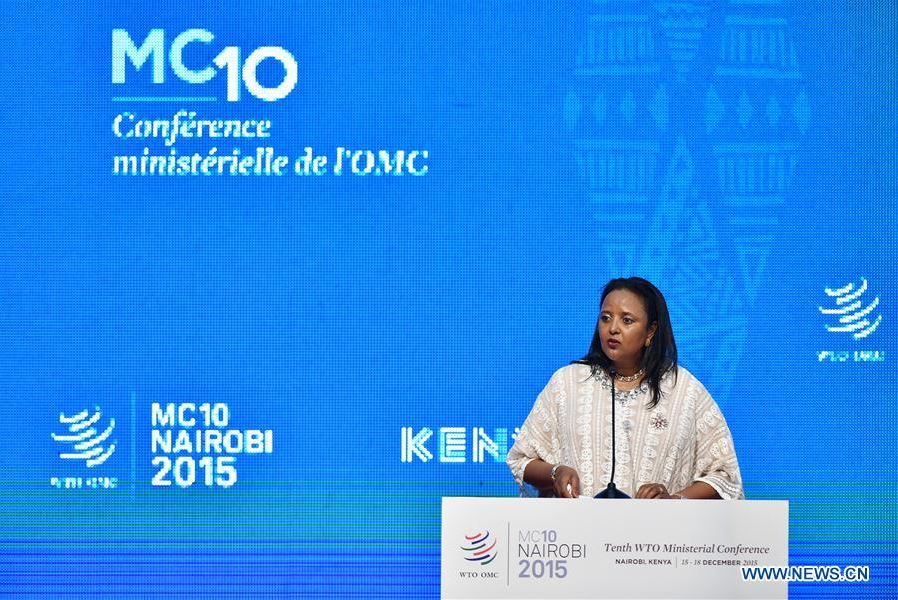
China on Wednesday backed India’s fight against attempts by the developed nations to introduce ‘new’ issues into the WTO’s Doha Round talks – meant for a pact to open up world trade – even before the member countries manage to arrive at a consensus on unresolved matters including on protection of poor farmers’ interests and food sovereignty.
China, in a statement at the plenary session of the WTO’s Nairobi ministerial conference, questioned how discussions on ‘new’ issues could begin when 162 member countries of the global trade body are finding it difficult to reach a meaningful consensus on several issues including on food security.
The ministerial conference is the WTO’s highest decision making body.
Beijing said it was important to ensure that the Doha Round first addresses the rule deficit, development deficit and distortions in global trade. It asked the member countries, including the big economies, to show political will and contribute more for successfully concluding the Doha Round talks.
China has been stressing the need to strengthen the WTO and have opposed the trend of proliferation of mega regional trade agreements. Incidentally, China is not part of Trans-Pacific Partnership (including the US and 11 other Asia-Pacific countries) and Trans-Atlantic Trade and Investment Partnership (the proposed trade pact between the US and the EU).
■’Conclude the deal in Nairobi’
Meanwhile the European Union (EU) Trade Commissioner Cecilia Malmström said though the EU is ready to support measures to allow the Least Developed Countries to better integrate in global trade, “there are also broader issues to consider.”
“We cannot deny that despite our efforts, this organisation has not functioned as well as we would have liked. We need to create the conditions to allow the machinery of the WTO to advance,” she added.
Malmström, significantly, said the time has come to conclude this deal (for opening up global trade) and there is no better place than Nairobi to do it.
She said the WTO members, while addressing the remaining outstanding issues, also need to agree during the Ministerial Conference on what to do next. “We cannot however simply repeat what we have been doing for the last 15 years and expect different results. We need to approach the issues from a different direction and give them the full creativity of our minds,” she said.
The member countries need to inject more dynamism into the WTO by starting to explore in Nairobi those issues that they negotiate in regional trade deals, she said, adding that this will allow the WTO to advance in areas relevant for today’s trade. “If we do it, the organisation we so much aim to support will regain the central role in trade negotiations it deserves,” she sad.
■New issues in TPP, TTIP
The rich nations, referring to the slow progress of the ongoing Doha Round negotiations, have expressed a great interest in bringing the Doha Round to a premature end during this ministerial conference. Alternatively, they want the Round’s ambit to be expanded by including ‘new’ issues of their interest and what they call are the latest challenges facing global trade. These include global value chains, e-commerce, labour, environment, competition policies, investment pacts and state-owned enterprises, on all of which the rich nations have much superior standards / rules than the developing and poor countries.
Many of these new issues have figured in the mega regional trade agreements including the TPP and TTIP. Developing and poor countries feel introduction of new issues is an indirect attempt by rich countries to open up the markets in the developing / poor world, and fear that the high standards / rules of rich countries on these aspects might become non-tariff barriers, hurting their (developing /poor countries’) exports.
Malmström said though after the 2013 Bali Ministerial Conference, there were high hopes and high ambitions for a comprehensive deal, the member countries now fear that even a much smaller outcome is at risk.
“We should remember that we are talking about a development round and that means we have to deliver for the world’s Least Developed Countries,” she said.
Meanwhile, Indonesia, a major developing/emerging market country, said member countries should not leave Nairobi with a zero result outcome as that would be disastrous for the already sluggish world trade, as well as for the reputation of the WTO. The nations should at least agree on a small package that will include progress in outstanding agriculture issues, it said.
Brazil said if the Nairobi meet fails to deliver a successful outcome, the WTO as an institution could crumble. Brazil, a leading agriculture exporter, said it was important to address the issue of drastically reducing the trade distorting farm subsidies of rich nations, adding that there was also a need to ensure enough market access for farm products.